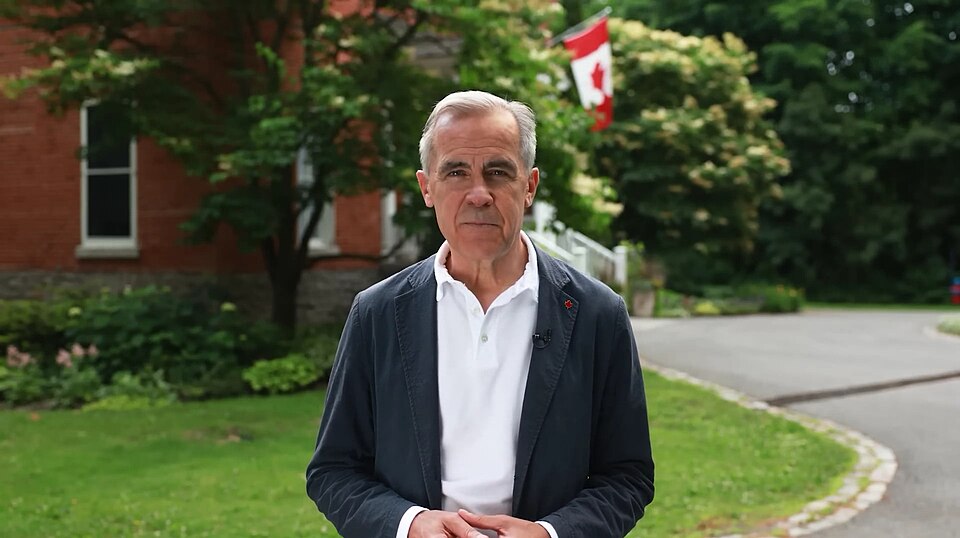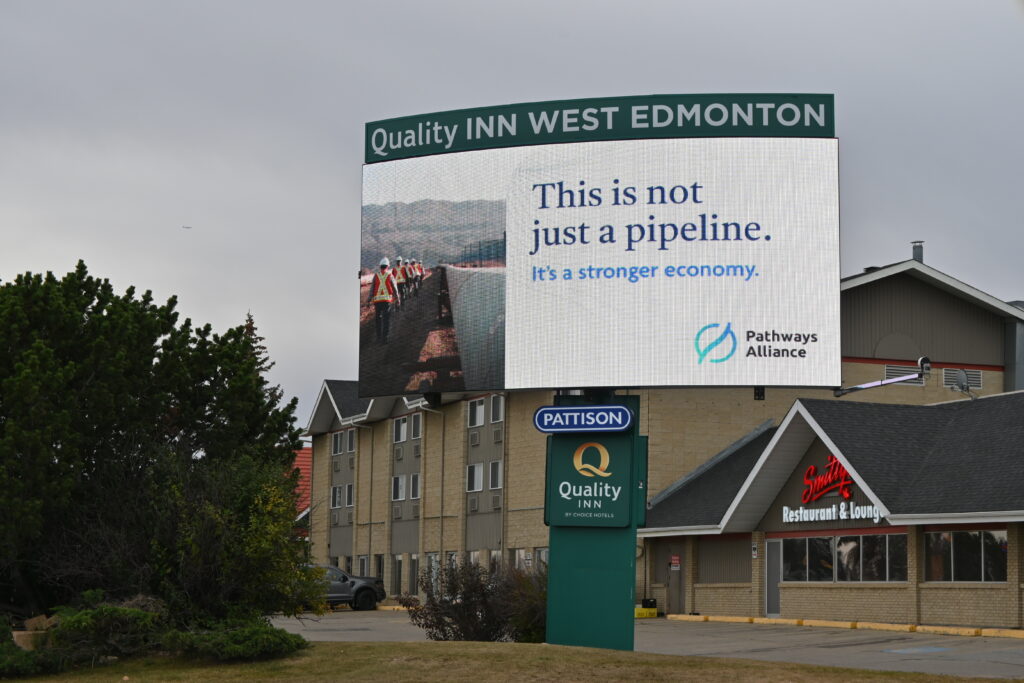Despite considerable public funding, aggressive ad campaigns, and optimistic pronouncements by politicians of various stripes over the last few years, there were no major project announcements at Canada’s annual carbon capture expo this year.
Neither were there any announcements related to Pathways Alliance, the signature carbon capture and storage project (CCS) of Canada’s tar sands producers.
The fourth edition of the annual Carbon Capture Canada expo, held September 23 to 25 in Edmonton, appeared to have fewer panel discussions and keynotes, did not feature speakers from the tar sands consortium Pathways Alliance, and did not include addresses from federal government representatives, as was the case in previous years.
Though employees of Environment and Climate Change Canada and Natural Resources Canada attended, representatives of the federal cabinet were conspicuously absent. This is significant because it is the first carbon capture expo to be held under Prime Minister Mark Carney’s new government, and Carney has been aggressively pushing for energy infrastructure development to counteract the tariff war instigated by U.S. President Donald Trump.
In 2021, the Pathways Alliance — a consortium of six major Canadian tar sands oil producers — proposed a massive carbon capture and storage project for Northern Alberta. The project would connect more than 20 tar sands production facilities via a 400-kilometer network of carbon dioxide pipelines to a massive subterranean storage facility in the vicinity of Cold Lake, Alberta.
The initial estimated cost of the project was $16.5 billion, with Pathways Alliance expecting the federal government to cover up to 75 percent of the total cost. Pathways has claimed the project will be able to store 1,100 megatonnes of carbon dioxide and has advocated for it by arguing it will help “decarbonize” Canada’s emissions-intensive tar sands heavy crude oil.
However, these claims have been challenged by environmentalists, climate scientists and energy economists. Among other criticisms, experts have derided the Pathways project as nothing more than greenwashing, noting that downstream emissions from continued tar sands production would exacerbate climate change. As previously reported by DeSmog, Pathways Alliance scrubbed their website of practically all content before Canada’s anti-greenwashing laws came into effect in June 2024.
Pathways Project Not on Carney’s List
Prime Minister Carney stated on September 11 that the Pathways plan for reaching net zero by expanding CCS infrastructure was a “potentially viable project,” and also said that the government would accelerate work on it. However, Carney did not include Pathways among the first five projects referred to Canada’s new Major Projects Office, a federal government initiative to fast-track infrastructure development deemed in the national interest.

LNG Canada Phase 2, which aims to double liquid natural gas (LNG) production at the Kitimat British Columbia facility, was the first project on the list.
Carney indicated federal support for a new West Coast pipeline could be tied to progress on the Pathways carbon capture project, which the Globe and Mail described as “stalled.” Championed by Alberta Premier Danielle Smith, the new proposed oil pipeline does not have a private sector project sponsor, nor a planned route, and has been rejected by the government of British Columbia as well as Indigenous communities in northern B.C.
Because of the lack of a private sector partner, Smith recently declared that Alberta would sponsor the project, despite concerns the proposed pipeline may not be financially viable.
Pathways’ latest public statements do not mention their CCS project. On October 1, the group issued a statement supporting Danielle Smith’s announcement that the government of Alberta would be the chief proponent of the proposed West Coast pipeline. The brief statement made no mention of carbon capture whatsoever, though it did describe the so-called ‘Emissions Cap’ and ‘West Coast tanker ban,’ as well as the Federal Impact Assessment Act, as barriers to future development that must be addressed.
In a potential indication of major project retooling, new advertisements from Pathways Alliance, recently spotted in Alberta, are moving away from references to carbon capture. An electronic billboard photographed by DeSmog in Edmonton stated “This is not just a pipeline. It’s a stronger economy.”
The ad was part of a national campaign that launched in mid-September, part of what Pathways describes as their “commitment to communicate on behalf of the oil sands and the many Canadians who work in the industry.” Whether this is indicative of fundamental changes to Pathways’ proposed multi-billion-dollar carbon capture project isn’t clear.

Pathways Project Missing from 2025 Conference
Pathways Alliance officials did not speak at the carbon capture expo’s strategic conference, and there were no speakers representing any of the six major tar sands producers who compose Pathways Alliance either. In 2024, by contrast, a Pathways official provided a keynote address on the first day of the convention. DeSmog found only one representative from one Pathways tar sands company — Imperial Oil — participating in an “executive dialogue session” taking place in the convention hall, separate from the main strategic conference.
The first full panel talk of the convention was “Navigating CCUS Uncertainty in a Global Market: An Opportunity for Canada?” The discussion was centered on a recent decision by the Trump administration to cancel $3.7 billion USD in funding for carbon capture and other so-called emissions reduction technologies.
Whether or not this means the Pathways project is dead in the water isn’t clear.
Pathways Alliance did not respond to DeSmog’s request for comment.
Though the project was listed on the prime minister’s September 11 major projects announcement, it was only mentioned in a secondary section of projects believed to be potentially transformative, but which need additional development.
However, the statement from the Prime Minister’s Office referred to the project as “Pathways Plus,” perhaps reflecting the idea that the original Pathways project will be modified to include pipelines for conventional fossil fuel transport purposes. The government’s Pathways Plus description suggests both an “Alberta-based carbon capture, utilization, and storage project and pipeline that will substantially reduce emissions” with additional energy infrastructure that “will support a strong conventional energy sector while driving down emissions from the oil sands.”
The government also said in the announcement that Pathways Plus “creates the prospect of facilitating low-carbon oil exports from the Alberta oil sands to a variety of potential markets.”
A backgrounder on the major projects under consideration by the federal government doesn’t provide much more detail, other than to say that the Major Projects Office would “develop a strategy to build the Pathways project which would reduce upstream emissions from the conventional energy sector, while catalyzing private investment in additional energy infrastructure that would support a strong conventional energy sector while driving down emissions and emissions intensity from the oil sands.”
The Deception Behind ‘Low-carbon Oil’
Experts have long argued that carbon capture projects such as Pathways are misleading because any reduction in upstream emissions would be compromised by the downstream emissions that would be a consequence of continued oil production.
The term “low-carbon oil” — widely used by Carney in describing Pathways and other fossil fuel projects — is an inherently misleading industry term whose continued use by the prime minister is a serious concern to experts. Speaking to CBC News, Memorial University political scientist Angela Carter stated, “Low-carbon oil is not a thing. It doesn’t exist. It’s an impossibility.”
It is also unclear how federal support for the new oil pipeline Smith is proposing will encourage the Pathways Alliance tar sands producers to move ahead with their CCS project, since Pathways has already been promised government support for initial capital costs, and demand for Canadian oil seems insufficient to merit additional pipeline infrastructure.
High operating costs — not start-up capital — are likely the Pathways project’s chief stumbling block, according to the Globe and Mail. Both the federal government and the government of Alberta had already indicated they would cover more than 60 percent of the project’s capital costs. However, a major report from the Institute for Financial Analysis and Energy Economics published earlier this year revealed that Pathways would be a subsidy-dependent financial risk with limited revenue potential.
How exactly the federal government plans to “catalyze private investment” given the already considerable promises of additional public subsidy has not been explained in any of the government’s recent statements pertaining to Pathways. The government of Alberta’s recent statement that it would champion new pipeline development — because no private sector proponent could be found — suggests that the fossil fuel sector isn’t interested in new energy infrastructure projects nor in various government incentives.
The Pathways idea — which was originally called Oilsands Pathways to Net Zero —dates back to 2021, and the alliance’s partners announced its signature carbon capture project in June of 2022. According to timelines laid out in the first iteration of the Pathways Alliance website, the project aimed to develop its carbon transport and storage system by 2030.
In September 2023, DeSmog reported that Pathways had not consulted with Cold Lake First Nations about their carbon capture project, a task central to getting it produced. Chief Kelsey Jacko was an invited guest of that year’s carbon capture expo, and made the announcement during a panel discussion. At the time, Pathways was engaged in a nationwide advertising campaign that included misleading advertisements on public transit that insinuated the CCS project was in development.
Prior to that, Pathways’ news release from September 16th reiterated the ‘Build Canada’ manifesto in another open letter to Mark Carney. Though Pathways Plus is mentioned once in the letter, carbon capture is not.
The post No Federal Ministers or Major Announcements at Leading Canadian Carbon Capture Expo appeared first on DeSmog.
This post has been syndicated from DeSmog, where it was published under this address.
